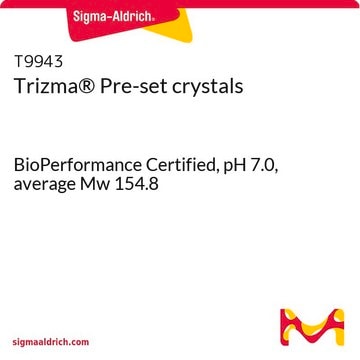T1819
Trizma® hydrochloride solution
pH 7.0, BioPerformance Certified, 1 M, suitable for cell culture
Synonym(s):
Tris hydrochloride solution
About This Item
Recommended Products
grade
BioPerformance Certified
for molecular biology
form
liquid
concentration
1 M
technique(s)
cell culture | mammalian: suitable
impurities
DNase, RNase, Protease, none detected
bioburden, tested
endotoxin, tested
≤5 ppm Heavy metals (as Pb)
pH
7.0
useful pH range
7.0-9.0
absorption
≤0.05 at 290 at 40%
Looking for similar products? Visit Product Comparison Guide
General description
Application
- as a buffer in reverse transcription and DNase I treatment reactions for RNA isolated from Toxoplasma gondii
- in the preparation of tris- ethylenediaminetetraacetic acid (EDTA) (TE) buffer for bacterial pellet resuspension for plasmid isolation studies
- for polylactic acid nanoparticle resuspension, storage, and pH-based stability studies
Legal Information
Storage Class Code
10 - Combustible liquids
WGK
WGK 2
Flash Point(F)
Not applicable
Flash Point(C)
Not applicable
Personal Protective Equipment
Certificates of Analysis (COA)
Search for Certificates of Analysis (COA) by entering the products Lot/Batch Number. Lot and Batch Numbers can be found on a product’s label following the words ‘Lot’ or ‘Batch’.
Already Own This Product?
Find documentation for the products that you have recently purchased in the Document Library.
Customers Also Viewed
Our team of scientists has experience in all areas of research including Life Science, Material Science, Chemical Synthesis, Chromatography, Analytical and many others.
Contact Technical Service







